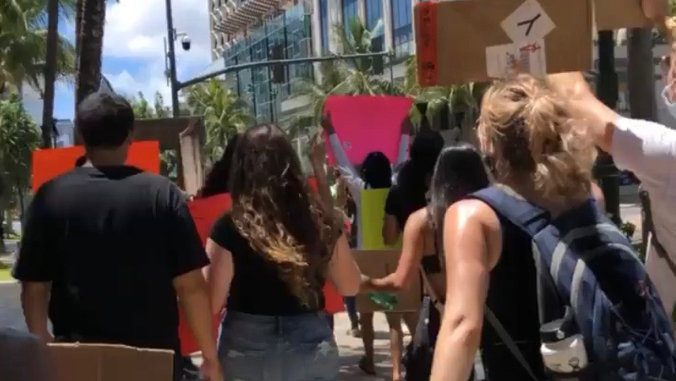
This message was shared with the students, faculty, and staff of the 10-campus University of Hawaiʻi system on June 1, 2020.
Aloha to all our UH students, faculty and staff:
We can not ignore the events that have rocked the United States in the past week, with impacts that continue to reverberate. We have seen the senseless killing of George Floyd by some of those entrusted to serve and protect us. We are seeing our systems of justice failing African-Americans. We are seeing moving memorials to the victims and we are seeing beautiful peaceful protests. Sadly, we also bear witness to destructive manifestations of anger and despair.
While these events may seem to some to be far away from our shores, they have a deep impact on our UH ʻohana and in particular our African-American community. African-Americans have centuries of history in Hawaiʻi and are a vital part of our university. Now is a time to stand in solidarity with our African-American colleagues and friends.
The sheer magnitude of the reaction we are seeing to the killing of George Floyd is about much more than his death. As one member of our ʻohana shared: “It is police brutality. It is about running in a neighborhood and being killed. It is about a white woman calling the police on a black man because he asked her to leash her dog. This is about a faculty member calling the police on an African-American student because he would not change his seat. This is about a black woman napping in her residence hall common area and security being called because she looked like she didn’t belong. This is about two black men sitting in Starbucks and the police being called. This is about Emmett Till and Trayvon Martin. And this is about the personal terror of every African-American parent when their sons are out in the world. This is about living black in America.”
My parents believed the education of their children in the 1960s should include participation in rallies and marches promoting peace and civil rights. Now, 50 years later, their lessons still resonate. So let me share a quote from Dr. Martin Luther King, Jr. from 1967, when our nation was also roiled:
“Certain conditions continue to exist in our society, which must be condemned as vigorously as we condemn riots. But in the final analysis, a riot is the language of the unheard. And what is it that America has failed to hear? It has failed to hear that the plight of the Negro poor has worsened over the last few years. It has failed to hear that the promises of freedom and justice have not been met. And it has failed to hear that large segments of white society are more concerned about tranquility and the status quo than about justice, equality and humanity. And so in a real sense our nation’s summers of riots are caused by our nation’s winters of delay.”
We can and must create a climate of aloha for all within the University of Hawaiʻi. We are fortunate to live in a place where we can learn from such time-tested wisdom, and I urge all of us to be attentive to the importance of extending kindness, compassion and understanding to all, especially in difficult times like these. And those who feel the need for a little extra assistance should not hesitate to reach out for help from a friend, a colleague and/or an appropriate campus support office.
I ask you all to stand with me against racism and discrimination. We must all be willing to speak up against corrosive “isms” wherever we see them. We are fortunate that in Hawaiʻi and at UH there have been and continue to be so many leaders and initiatives that teach us how to do this important work. And I fully recognize that we all, including me, still have a long road ahead.
None of us alone can reverse the impacts of the history of mistreatment and discrimination that we see playing out before our eyes today. But we can each make a beginning by acknowledging for ourselves the continuing impact of that history and vowing to work to reduce it on our watch. An equitable system of public higher education can and must be one of the most powerful forces for positive change, and we can do so much for justice, equality and humanity if we work together.
Mahalo,
David Lassner
UH President

